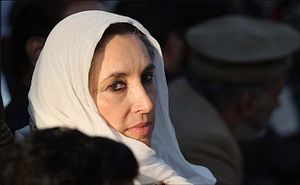“We have sacrificed much for the sake of democracy and politics to save Pakistan. We will not leave this Mughal emperor [Prime Minister Nawaz Sharif] to rule,” said Asif Ali Zardari, the co-chairman of the Pakistan’s Peoples Party (PPP) a few days ago after returning to Pakistan from an 18 month long self-imposed exile. Additionally, Zardari also announced that he along with his son, Bilawal Bhutto Zardari, who is also the chairman of the PPP, would contest elections to become part of the current parliament.
These developments have coincided with the party’s earlier announcements that ended up changing the provincial-level leaderships of Punjab and Sindh. The focus of the party’s leadership has solely been on Punjab as a majority of the party’s political activities for the next year are planned in the province.
The logic behind this political focus is very simple: Without making a mark in Punjab in the next general elections, the PPP cannot neutralize the current ruling party, the Pakistan Muslim League. At the moment, the party’s virtual disappearance from the province has virtually turned the PPP into a regional organization, whose sphere of influence has been restricted to Sindh.
In fact, even in Sindh, over the last decade, the party has slowly lost its control in a majority of urban areas with the Pakistan Tehreek–e–Insaf (PTI) and other smaller parties chipping off the former’s vote bank. The PPP’s only committed vote bank is based in rural Sindh that by and large has come to define its survival in the face of a multitude of political challenges, ranging from its corruption-littered governance records to the alienation and loss of the organization’s ideological voters across the country.
While the party is all focused on reviving its political base in Punjab, it’s unlikely that the PPP will be able to successfully transform its planned rallies for next year into electoral success a year later. Three main challenges stand out in this regard. First, the PML-N’s traditional stronghold in the province that the party has further consolidated in the last few years and its relatively better economic performance due to number of domestic and external factors is likely to become a key factor when it comes to amassing broad political support. In effect, this may surely shrink the PPP’s electoral successes, not only in Punjab, but also in Khyber-Pakhtunkhwa (KPK) and Baluchistan.
Moreover, the party doesn’t have sufficiently credible political figures and heavyweights at its disposal that can lead it to any measurable success. After the assassination of Benazir Bhutto nine years ago, a majority of its political figures that were committed workers of the party were either let go by the current leadership or became disillusioned with the party’s new political priorities. In Punjab, besides a handful of political personalities, there are no committed political figures left who can rally the masses around the party’s founding leadership message. It is unlikely that political leaders from the PTI or PML-N would jump ship to the PPP in the months and weeks leading up to the next general elections for the latter’s immediate future doesn’t offer any promising legislative prospects.
Third, the party no longer holds true to its early mission of fighting for the country’s poor and its youth who once comprised the core of its support base. By and large, corruption and bad governance have delegitimized the PPP in the eyes of youth and poor who even seem indifferent to Bilawal’s repeated appeals and promises of returning the party to its past glory.
Moreover, the country’s young generation doesn’t have a direct association with the party’s populist ideology that over the last four decades was built on the theme of victimhood because of the unnatural deaths of Benazir Bhutto and her father.
One can argue that the PPP leadership’s recent decision to amend the Minorities Act – the act criminalizes forced conversions – in Sindh after pressure from Punjab-based Islamist parties is meant to allure the province’s religious lobby for a possible future political alliance.
The new leaderships’ interest-based rather than principle-based approach to politics and continued focus on martyrdom rather than adaptability towards new political realities have buried the PPP’s future in national politics for the foreseeable future.

































